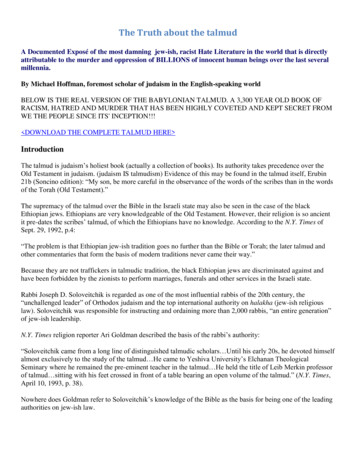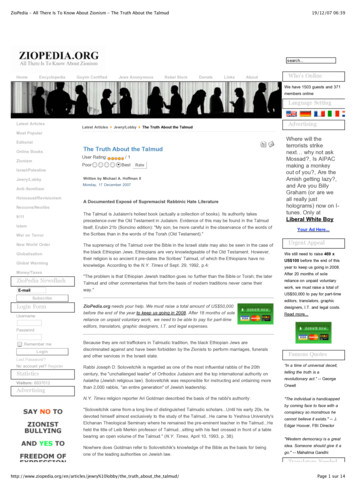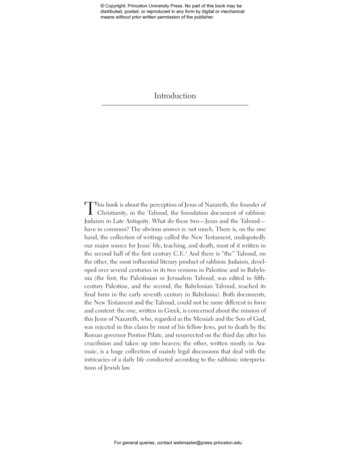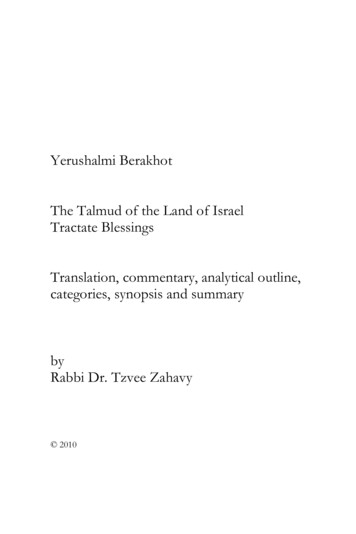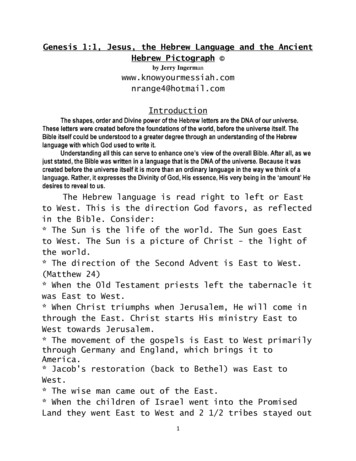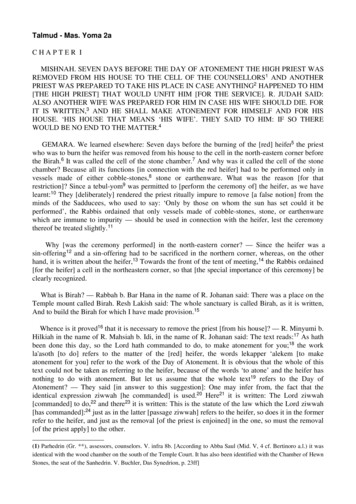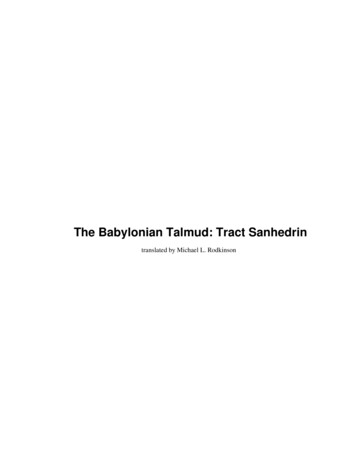
Transcription
The Babylonian Talmud: Tract Sanhedrintranslated by Michael L. Rodkinson
The Babylonian Talmud: Tract SanhedrinTable of ContentsThe Babylonian Talmud: Tract Sanhedrin.1translated by Michael L. Rodkinson.1EXPLANATORY REMARKS.1A WORD TO THE READER.2SYNOPSIS OF SUBJECTS.3OF.3TRACT SANHEDRIN (SUPREME COUNCIL).3CHAPTER I.13Footnotes.35CHAPTER II.35Footnotes.46CHAPTER III.46Footnotes.64CHAPTER IV.64Footnotes.73CHAPTER V.73Footnotes.79CHAPTER VI.79Footnotes.90CHAPTER VII.92Footnotes.118CHAPTER VIII.119Footnotes.130CHAPTER IX.130Footnotes.143CHAPTER X.143Footnotes.152VOLUME VIII. (XVI.)TRACT SANHEDRIN.153PART II.(HAGGADA.) .153CHAPTER XI.153Footnotes.215i
The Babylonian Talmud: Tract Sanhedrintranslated by Michael L. RodkinsonThis page copyright 2002 Blackmask Online.http://www.blackmask.com EXPLANATORY REMARKS A WORD TO THE READER. SYNOPSIS OF SUBJECTS OF TRACT SANHEDRIN (SUPREME COUNCIL). CHAPTER I. Footnotes CHAPTER II. Footnotes CHAPTER III. Footnotes CHAPTER IV. Footnotes CHAPTER V. Footnotes CHAPTER VI. Footnotes CHAPTER VII. Footnotes CHAPTER VIII. Footnotes CHAPTER IX. Footnotes CHAPTER X. Footnotes VOLUME VIII. (XVI.) TRACT SANHEDRIN. PART II. (HAGGADA.) CHAPTER XI. Footnotes'scanned at sacred texts.com, Feb July 2002, J.B. Hare, redactorEXPLANATORY REMARKSIn our translation we adopted these principles:1. Tenan of the originalWe have learned in a Mishna; TaniaWe have learned in a Boraitha; ItemarIt wastaught.2. Questions are indicated by the interrogation point, and are immediately followed by the answers, withoutbeing so marked.The Babylonian Talmud: Tract Sanhedrin1
The Babylonian Talmud: Tract Sanhedrin3. When in the original there occur two statements separated by the phrase, Lishna achrena or WaïbayithAena or Ikha d'amri (literally. "otherwise interpreted"), we translate only the second.4. As the pages of the original are indicated in our new Hebrew edition, it is not deemed necessary to markthem in the English edition, this being only a translation from the latter.5. Words or passages enclosed in round parentheses denote the explanation rendered by Rashi to theforegoing sentence or word. Square parentheses contain commentaries by authorities of the last period ofconstruction of the Gemara.TO HIM WHO RANKS AMONG THE FIRST PHILANTHROPISTS OF OUR CO RELIGIONISTSABRAHAM ABRAHAM, ESQ.IN RECOGNITION OF HIS GENEROUS DEEDS TOWARD PROMOTING LITERATURE INGENERAL AND JUDAISM IN PARTICULAR, THIS BOOK IS MOST RESPECTFULLY DEDICATEDBY THE TRANSLATORMICHAEL L. RODKINSONNEW YORKIN THE MONTH OF ELUL,5662 (SEPTEMBER 18TH, 1902)A WORD TO THE READER.MANY books have been written by the scientists of the last century, and many lengthy articles have appearedin the various periodicals, concerning the Jewish high court, and this tract, which, if extracts were given,would make an entire bulky volume in itself. However, we deem it best to give the reader the informationwhere these are to be found. The time during which the Sanhedrin were established is the main topic of theirdiscussions. Zunz, for instance, gives the time from King Simeon of the Maccabees. Jost states that it wasfrom the period of Hyrcan. And an anonymous writer in "Israelitische Annalen," Vol. I., pp. 108 134,maintains that they were established at an exceedingly earlier date, and that the Greek name "Sanhedrin" waschanged during the time of the second Temple. At all events, Schürer, in his "Jüdische Geschichte," wrote alengthy article on this subject, in Vol II., from p. 188 to 240 (where there is to be found a bibliography of thesubject), concluding with his opinion that the high court began at an earlier time. Z. Frankel, too, in hisarticle, "Der gerichtliche Beweis," Berlin, 1848, claims that the establishment of the jury in the entirecivilized world was taken from the Sanhedrin. All this was written in Germany. An English book by RabbiMendelsohn also treats upon this topic. We, too, will have something to say concerning this in ourforthcoming "History of the Talmud." We are inclined, in many respects, however, to accept the opinion ofReifmann, given in his Hebrew book, "Sanhedrin," Warsaw, 1888. He says that courts were even establishedin the days of Noah, the judges of which were Shem, Abraham, Isaac, and Amram, continuing until Moses.He, in turn, established a court of seventy judges, and from that time the Supreme High Court was of thatnumber (seventy one, including Moses), and thereafter supreme courts of twenty three, and courts of three,were established at all times, and wherever the Jews resided; the sages of the second Temple naming thesecourts "great" and "small" Sanhedrin. Reifmann's reasons are gathered from the post biblical literature, andare based upon the Bible. According to him, the three judges had to decide civil cases only, the twenty three,criminals and capital punishments, and the seventy one were a political body, who were to decide also thegreat events; as, for instance, an entire tribe, or the princes and heads of tribes. We, however, would say thatA WORD TO THE READER.2
The Babylonian Talmud: Tract Sanhedrinthe court of three had also to decide criminal cases to which capital punishment did not apply. So it seems tous, from this tract, p. 212 of the Talmud, that a stubborn and rebellious son was punished with stripes by acourt of three, before being finally sentenced to death by the court of twenty three.Reifmann also quotes from "Midrash Aggada," that before prophesying a prophet was obliged to getpermission from the Sanhedrin, who previously tried him whether he was a true prophet or not We may hereadd that this contradicts the Talmud, for it says that to recognize a true prophet was by demanding a sign, p.260, and if the prophet would have been obliged to get the permission of the Sanhedrin, this would certainlybe mentioned in the Talmud instead.This is as much as we have to say in regard to the time and name, and that the Sanhedrin ceased about fortyyears previous to the destruction of the Temple. At the same time we would call the attention of the readers tothe fact that this tract distinguishes itself from all others in Halakha as well as in Haggada. Aside from themany strange explanations of the verses of Scripture, which are not used in other extracts, it says plainly thatthere are numerous laws written in the Pentateuch which have never occurred, and never will occur, but thatthey were written merely for study. The Haggada also distinguishes in taking the power to judge upon theBible personages if they are to have a share in the world to come, and also in criticism of their acts, even ofthe most holy of them. This is self evident that the later commentaries, and especially the cabbalists,interpreted the Haggada after their ways. We, however, have translated it almost literally, with an effort tomake it in some respects intelligible to the general reader, and have also added footnotes, where we deemed itnecessary. And we may say that the real student will find much pleasure if he will devote his special attentionto this tract.For this purpose we have made from this celebrated tract a double volume, as we deem it will please thereaders and the students, and will also equalize the size of the volumes.M. L. R.September16, 1902.SYNOPSIS OF SUBJECTSOFTRACT SANHEDRIN (SUPREME COUNCIL).CHAPTER I.MISHNA I. To which cases judges are needed to decide, and to which commoners; which three, five,twenty three, and seventy one. The Great Sanhedrin consisted of seventy one, and the Small oftwenty three. How many a city should contain, that it should be fit for a supreme council. If one were knownto the majority of the people as an expert, he alone might decide civil cases. A permission from the Exilarchholds good for the whole country (of Babylon and also for Palestine); from the Prince in Palestine, for thewhole of Palestine and Syria only: he may teach the law, decide civil cases, and may also decide upon theblemishes of first born animals. He (a priest) saw a divorced woman and married her, and with this heannulled his priesthood. He erred in his opinione.g., there were two, Tanaim and two Amoraim who differedin a case, and he decided the case according to one. There are three Tanaim who differ concerning arbitration.When the decision is already given in accordance with the strict law, an arbitration cannot take place. May orSYNOPSIS OF SUBJECTS3
The Babylonian Talmud: Tract Sanhedrinmay not a judge say, "I do not want to decide this case"? and under what circumstances? Is mediation ameritorious act, or is it only permitted? There were many who used to say maxims of morality, and Samuelfound that they were only repetitions of verses in the Scriptures. "Say unto wisdom, Thou art my sister,"means, if the thing is certain to you as that it is prohibited for you to marry your sister, then you may say it;but not otherwise. If one appoints a judge who is not fit to be such, he is considered as if he were to plant agrove in Israel. The court shall not listen to the claims of one party in the absence of the other (in civil cases)."You shall judge righteously" means, you shall deliberate the case carefully, and make it just in your mind,and only thereafter may you give your decision: "For the judgment belongeth to God." The Holy One, blessedbe He, said: "It is the least for the wicked to take away money from one and give it to another illegally," etc.Is warning needed to a scholar? Where is the hint that collusive witnesses are to be punished with stripes?Punishment of stripes is not applied to those who do no manual labor. The numbers three, five, and seventowhat have they a similarity?A year must not be intercalated with one month, except by them who are invited for it by the Nashi. Since thedeath of the last prophetsHaggai, Zechariah, and Malachithe Holy Spirit has left Israel, etc. A leap yearshould not be made because of the kids, lambs, etc. For the following three things a leap year is made:Because of the late arrival of Spring, etc. A leap year must not be made in the years of famine, The year mustnot be intercalary before Rosh Hashana. A leap year must not be made in one year for the next. Noappointment of a leap year must be because of defilement. If not for Ben Baba, the law of fines would beforgotten from Israel. The legend how Jehudah b. Baba supplied the degree of Rabbi to five (six) elders, andby this act he caused the oral law not to be forgotten from Israel. The custom of giving degrees must not beused out of Palestine. What is to be considered second tithe, of which the value is not known? Rotten fruit,etc. "Every great matter," means the matter of a great man. By the whole tribe, is meant the head of it. Thelegend how a battle was decided by King David. Whence do we know that it is a duty to appoint judges toeach tribe? etc. The legend of Eldad and Medad, and what their prophecy was. How Moses selected theseventy elders from each tribe, and also the payment of the first born who were not redeemed by Levites.Sentence of guilt must be by a majority of two. If all persons of a Sanhedrin are accusing, the defendantbecomes free. How so? In a city in which the following ten things do not exist it is not advisable for a scholarto reside. and they are, etc. Of rulers of thousands were six hundred; of hundreds, six thousand; of fifties,twelve thousand; of tens, sixty thousandhence the total number of the officers in Israel was seventy eightthousand and six hundred. 1 42CHAPTER II.MISHNAS I. AND II. The high priest may judge and be a witness; be judged and witnessed against. A kingmust not judge, and is not judged; must not be a witness, nor witnessed against. There are cases from whichone may withdraw himself, and there are others from which he may not. How so? A king must not be amember of the Sanhedrin; nor he and a high priest engage in discussion about a leap year. The legends ofthree pasturers who had a discussion about the month Adar, which the rabbis took as a support to establish aleap year. When he (high priest) goes in the row to condole with others, his vice and the ex high priest areplaced at his right, etc. Formerly the custom was for the mourners to stand, and the people to pass by, etc. Arow is not less than ten persons, not counting the mourners. All agree that if a king has relinquished hishonor, it is not relinquished. How could David marry two sisters while they were both living? The strength ofJoseph was moderation on the part of Boas, and the strength of the latter was moderation on the part of Palti,etc., etc. If a death occurs in the house of the king, he must not leave the gate of the palace, 43 52MISHNAS III. TO VI. Three positive commandments was Israel commanded when they entered Palestine,viz., they should appoint a king, etc. The treasures of kings which are plundered in time of war belong to theking, only. He (the king) must not marry more than eighteen wives. Even onep. xiiiSYNOPSIS OF SUBJECTS4
The Babylonian Talmud: Tract Sanhedrinwife, should she be liable to turn his heart away, he must not marry her. The number eighteen mentioned inthe Mishnawhence is it deduced? Four hundred children were born to David by the handsome womenwhom he took captive (i.e., those mentioned in Deut. xxi. 11). Only a son may stay alone with his mother, butit is not allowed for any one besides to stay alone with a married woman. He (the king) must not acquiremany horses, neither more gold and silver than to pay the military. He shall not acquire many horses, and lestone say, "Even those which are needed for his chariots," etc. He shall not acquire much gold and silverlestone say, "Not even sufficient for paying the military," etc. Why does not the Scripture explain the reason ofits law? Because in two verses it was so done, and the greatest men of a generation stumbled because ofthem, etc. Ezra was wrothy that the Torah should be given through him, if Moses had not preceded him. Inthe very beginning the Torah was given to Israel in Assyrian characters, etc. (see footnote, 1 ). One must notride on histhe king'shorse, etc. Come and see how hard is divorce in the eyes of the sages! He whodivorces his first wife, even the altar sheds tears on account of him. The king must cut his hair every day, ahigh priest every eve of Sabbath, and a commoner priest every thirty days, 52 63CHAPTER III.MISHNAS I. TO III. Civil cases by three: one party may select one, and so the other, and both one more.Pure minded people of Jerusalem used not to sign a document unless, they were aware who was the otherwho was to sign it, and also would not sit down to judge unless they were aware who was to be theircolleague, etc. One has no right to reject a judge who was appointed by the majority. There is a rule that thetestimony of one who is interested in a case is not to be taken into consideration. Proof is needed to eachclaim, even if it is not so important that it could injure the case. He who saw Resh Lakish in the college sawone uprooting hills and crushing them, and he who saw R. Mair saw one uprooting mountains and crushingthem. Gamblers (habitual dice players) and usurers, and those who play with flying doves, are disqualified tobe witnesses. What crime is there in dice playing? Because they do not occupy themselves with the welfareof the world. One who borrows to pay usurers is also disqualified. Gamblers are counted those who play withdice; and not only with dice, but even with the shells of nuts or pomegranates. Among those who play withdovesother animals are also meant. There was added to the disqualified witnesses robbers and forcers (i.e.,those who take things by force, although they pay the value for them). There was secondly added to thatcategory, collectors of duty and contractors of the government. The father of R. Zera was a collector forthirteen years, etc. One's thought for his maintenance injures him in his study of the law, etc. They whoaccept charity from idolaters are disqualified to be witnesses, provided they do so publicly, etc. One who iswicked in money matters only is disqualified to witness, but not one wicked in heavenly matters. Bar Hamahad slain a man, and the Exilarch told Aba b. Jacob to investigate the case; and if he really slew the man theyshould make the murderers blind, etc., 64 79p. xivMISHNAS IV. TO VI. The following are counted relatives who may not be witnesses: Brothers, brothers offather or mother, brothers in law, etc. "My father's brother shall not witness in my cases; he, his son, and hisson in law." "The brother of my mother in law cannot be a witness for me." The husband of one's sister,also the husband of the sister of one's father and the husband of the sister of one's mother, their sons and theirsons in law, are also excluded from being witnesses. A stepfather . . . his son in law, etc. There was a deedof gift which was signed by two brothers in law i.e., two husbands of two sisters, etc. How were thewitnesses examined? They were brought into separate chambers, etc. How were the witnesses frightened?There was one who had hidden witnesses under the curtains of his bed, and he said to his debtor: "Have I amana with you?" etc. There was one who was named by the people "the man who has against him a wholekab of promissory notes." There was another who was named "the mouse who lies on dinars," etc. There wasa document of confession in which it was not written: "He (the debtor) has said to us, 'Write a document,sign, and give it him' (the creditor)," etc. "I have seen your deceased father hide money in a certain place,saying, 'This belongs to so and so,'" etc. How is the judgment to be written? So was the custom of theSYNOPSIS OF SUBJECTS5
The Babylonian Talmud: Tract Sanhedrinpure minded in Jerusalem. They let parties enter, listened to their claims, and thereafter let the witnessesenter, listened to their testimony, then told all of them to go out, etc. This is a rule for every case in which ismentioned "a witness," that it means two. Simeon b. Alyaqim was anxious that the degree of Rabbi should begranted to Jose b. Hanina, etc., etc. A confession after a confession, or a confession after a loan, may beconjoined; but a loan after a loan, or a loan after a confession, do not join ( p. 91). Witnesses in civil caseswho contradict one another in unimportant investigations are to be considered. So long as the defendantbrings evidence to his advantage, the decision may be nullified by the court. However, if after he had said, "Ihave no witnesses," etc. What happened to R. Na'hman with a young man whom he made liable. If one whois summoning a party who says, "I want my case brought before the assembly of sages," etc., he maybecompelled to try his case in that city. In Babylon they are not allowed to try cases of fine, 79 96CHAPTER IV.MISHNAS I. TO III. Cases coming before the court, the witnesses thereof must be examined andinvestigated. What difference is there between civil and criminal? The following from (a) to (g). Biblicallythere is no difference between civil and criminal cases concerning investigations. But why is it enacted thatcivil cases do not need investigation? "Justice, only justice, shalt thou pursue," means that one shall follow tothe city of a celebrated judge, etc. What has the court first to say to the advantage of the defense in criminalcases? If one has tried a case, and made liable him who is not, or vice versa, etc. Tudus the physician testifiedthat not one cow or one swine was sent from Alexandria in Egypt of which the womb was not removed. Ifone was found guilty by the court, and thereafter one come, saving: "I know a defense for him, etc, So long asthe fire in thep. xvstove burns, cut off all that you want to roast, and roast it. ( i.e., when you are studying a thing, consider itthoroughly to prevent questions.) All who take part in the discussion may explain their reasons, until one ofthe accusers shall yield to one of the defenders. In the neighborhood of R. Johanan there was one who wasblind who used to judge cases, etc. From the time of Moses until the time of Rabbi, we do not find one manwho was unique in the possession of wisdom, riches, and glory, etc. One may teach his disciple, and at thesame time may judge in association with him in criminal cases. In ten things civil cases differ from criminalcases. All are competent to judge civil cases. But not all of them are competent to judge criminal cases. TheSanhedrin sat in a half circle in order that they could see each other, etc. The Torah has testified that we aresuch a kind of people that even a fence of lilies is sufficient for us, and will never be broken. How were thewitnesses awestruck in criminal cases? A human being stamps many coins with one stamp, and all of themare alike; but the Holy One, blessed be He, has stamped every man with the stamp of Adam the first, and,nevertheless, not one of them is like the other, Although the court of the Sanhedrin existed no longer, thepunishment of the four kinds of death prescribed in the Scripture was not abolished by Heaven. Adam thefirst was created singly, and why? That disbelievers should not say there were many Creators in heaven, etc.In three things one is different from his neighborin voice, etc., 97 114CHAPTER V.MISHNA I. The court used to examine the witnesses with seven inquiries, etc. Should one of the witnessessay, "I have something to say in behalf of the defendant," or one of the disciples, I have something to say tothe disadvantage of the defendant," the court silences him. Why not say that eight queries are necessary in theexamination? Viz., how many minutes are there in the hour? Do you recognize this man as the murderer ofhim who was slain? Was he a heathen or an Israelite? Have you warned him? Did he accept the warning? etc.Whence do we deduce that the warning is prescribed biblically? Witnesses who testified in case of abetrothed woman, if they be found collusive, are not to be put to death. What is the difference betweenexamination? etc. Until what time may the benediction of the moon be pronounced? If Israel should haveSYNOPSIS OF SUBJECTS6
The Babylonian Talmud: Tract Sanhedrinonly the meritorious act of receiving the glory of their heavenly Father once a month, it would be sufficient.They do not drink wine. And why not? In civil cases the court may say: The case becomes old, etc., 115 125CHAPTER VI.MISHNAS I. TO IV. If the conclusion was to condemn, the guilty one was taken out immediately to bestoned. A herald goes before him, heralding: So and so, etc. One stands with a flag. I doubt who had to bearthe cost of the flag and horse mentioned in the Mishna, etc. If one of the disciples said, "I have something tosay in behalf of the defendant," and thereafter he became dumb? He who is modest, the verse considers himas if he shouldp. xvisacrifice all the sacrifices mentioned in the Scripture. When he (the guilty) was far from the place ofexecutiona distance of ten ellshe was told to confess. Why are the words "unto us and to our children," andthe Ayin of the "ad" pointed? The Lord said to Joshua: Thou thyself hast caused all the evils, because thoudidst excommunicate the goods of Jericho. One should always proceed with prayer before trouble comes. Ithappened with one who was going to be executed, that he said: If I am guilty of this crime, my death shall notatone for all my sins. See footnote, 1, concerning the legend of Simeon b. S. of the eighty witches hung byhim. A male was stoned while naked, but not a female. The stoning place was two heights of a man, etc. Ifbefore the execution the hands of the witnesses were cut off, he becomes free from death. "The avenger of theblood himself shall slay." Infer from this that it is a meritorious act for the avenger to do so himself, 126 139MISHNAS V. AND VI. All who are stoned are also hanged. A male, but not a female. Two must not bejudged on the same day, provided there are two kinds of death. How was one hanged? The beam was put inthe earth, etc. King Sabur questioned R. Hama: Whence do you deduce from the Torah that one must beburied? etc. Is the burying because the corpse shall become disgraced if not buried, or is it because ofatonement? Is the lamentation an honor for the living or for the deceased? And what is the difference? etc. Awicked person must not be buried with an upright one. All the curses with which David cursed Joab fell onthe descendants of David. They were [II Sam. iii. 29], etc. If not for Joab, David would not have been able tooccupy himself with the law, etc., 139 148CHAPTER VII.MISHNAS I. TO V. Four kinds of capital punishment are prescribed to the court by the Scriptures. Accordingto R. Simeon, burning is more rigorous than stoning. With her father, burning applies; with herfather in law, stoning applies. How is this to be understood? Do you come to teach a Halakha which will beused only then when the Messiah will appear? The prescribed punishment of burning was this: The sinnerwas placed in waste knee deep. Then placing a twisted scarf of coarse material within a soft one, etc. Butwhy should burning not be inferred from the offerings of the bullocks, which were burned bodily? Nadobsaid to Abihu: When will the two old men die, and you and I be leaders of Israel? The prescribed punishmentof slaying was thus: He was decapitated, etc. The prescribed punishment of choking was thus: The sinner wasplaced in waste knee deep, etc. To the following sinners stoning applies: viz., one who had connection withhis mother, etc. "A man" means to exclude a minor. [Lev. xxii.]: "That lieth with his father's wife" means,that there is no difference whether she is his mother or not, 150 164MISHNAS VI. TO VII. One who had connection with a human male, or with an animal, and also a humanfemale who uncovers herself before a male animal, are punish
add that this contradicts the Talmud, for it says that to recognize a true prophet was by demanding a sign, p. 260, and if the prophet would have been obliged to get the permission of the Sanhedrin, this would certainly be mentioned in the Talmud instead.
